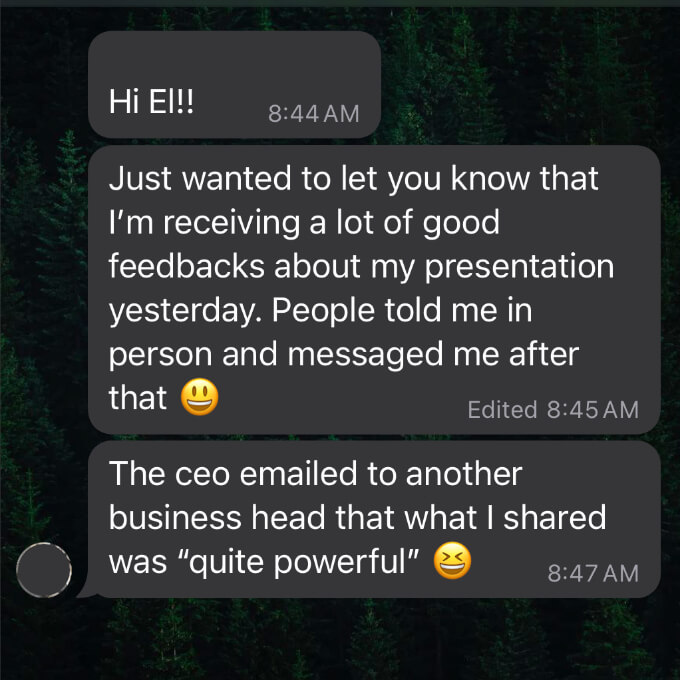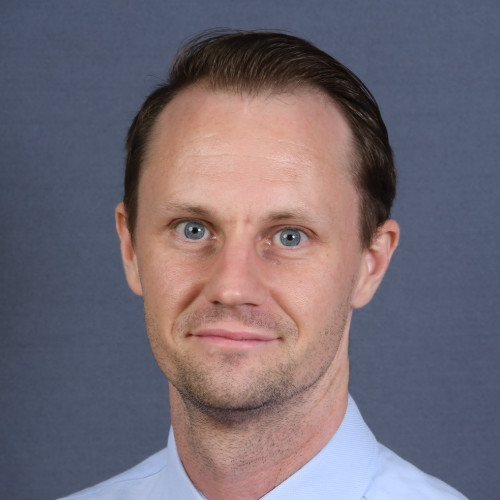Have you ever held the idea that to be professional means to keep emotions out? It’s a common misconception that many people believe, especially when it comes to public speaking, presentations and group discussions at the workplace. However, in my coaching practice, I’ve witnessed again and again how a person’s ability to speak in public suffer when they are not adept with emotions. Which is why I sometimes say that public speaking skills are, in very real ways, actually emotional skills.

One of the things I do as a communication and confidence coach, is to help you access and harness emotions – first and foremost within yourself, and then in others. Below, we’ll look at 3 ways that that public speaking skills are actually emotional skills, and how you can start to harness the power of emotions for clearer, more confident communication.
⚠️
Read on if you struggle with:
Mind going blank (or ‘brain fog’)
Structuring your words
Asserting your view
Speaking up at all
Overthinking
Anxiety
3 Ways Public Speaking Skills Are Actually Emotional Skills

① Being Comfortable With Emotion Is a Public Speaking Skill
One of the most significant ways your public speaking skills can suffer is when your awareness of emotions is low. When you’re disconnected from your emotions, you may come across as robotic or detached, which can distance your audience. This will also likely mean that what you say lacks emotional weight, making you less persuasive.
In another scenario, you’re delivering a presentation, and you’re so focused on sticking to the script that you overlook the emotional cues from your audience. Sometimes, they come in the form of questions that you think are objections, so you block them out and bulldoze through your script. Doing so means you miss opportunities to connect and adapt your message effectively to your listeners. This can create a tragic outcome, where the audience feels you’re off-track even though you were sticking closely to the script.

The work here is to become comfortable (or at least, more familiar) with emotions. You can learn how to better be with your emotions, as well as the emotions of others, so you can create a genuine connection with your audience. The ability to be with an emotion is a tolerance, not much different from how one might build the tolerance for spicy food. Developing this skill will enable you to adjust your message in real-time, making your communication more engaging and relatable.
② How to Not Let Overthinking & Self-Doubt Cripple Your Public Speaking
Overthinking is a pain many of my clients suffered before they found me. Overthinking or self-doubt can be crippling when it comes to speaking up in public. For a lot of people, it’s being indecisive to the point of paralysis, e.g. “Should I say it?” or “What if I’m wrong”? In the end, you decide to keep silent and not speak up at all. I’ve lost count of the number of times I heard clients share the feedback, “My boss tells me I need to speak up more,” or “I need to increase my visibility in meetings”.
In more serious cases, it can manifest as imposter syndrome, making you question your abilities and even self-worth. As a result, your confidence takes a nosedive, and your message becomes shaky and unconvincing. This often comes up in social interactions, and not just in professional contexts.

If you struggle with overthinking or self-doubt, I would work with you on strategies to bypass your paralysing thoughts. Because let’s face it – you won’t solve overthinking with more thinking. The way out of overthinking is action, which is ultimately sparked by emotion.
Reflect on your own history: are you more likely to take action because you logically knew you should, or when you strongly felt you had to or wanted to? Hence, harnessing the emotion behind your intention is one way to not let overthinking and self-doubt cripple your public speaking.
Ellery helped me to overcome my internal tension, and interact more calmly and clearly. I can definitely see my communication skills improving day by day as I continue to practice.
I engaged coach Ellery with the intention of improving the way I communicate and express myself.
Before working with Ellery, I was unable to communicate and express myself effectively. I tried various methods, including attending several online courses, but none of them seemed to have any significant results. That was when I came across Ellery. I decided to try working with him, having the expectation that it would be just another traditional communication course where you sit and listen to a lecture.
To my surprise, the way Ellery’s sessions were conducted was unlike any of the other courses I had attended in the past.
Instead of delivering a lecture, Ellery was able to identify the root cause of my communication issues, and offered many insights on how I could improve the way I think and feel by adjusting certain “bad habits” in my body.
Over the course of the coaching term, we explored many different techniques to help me overcome difficulties in communication, such as nervousness and losing my train of thought. By actively practicing the techniques that Ellery suggested, I was able to gradually overcome some of the communication difficulties I had.
Even now, I am still practicing the somatic techniques Ellery taught me. They help me to overcome internal tension, and interact more calmly and clearly. I can definitely see my communication skills improving day by day as I continue to progress.
What I learnt from Ellery didn’t just improve my communication skills; they also help improve overall mental health and confidence.
I would definitely recommend Ellery to anyone seeking self-improvement and in need of a coach or mentor who can guide and care for them through their journey of self-discovery and growth.
Thank you, Ellery, for being such a good coach, and for all the guidance you have given me on my self-discovery and improvement journey!
③ Expecting Anxiety Is Key To Better Public Speaking Skills
Anxiety is most destructive when you chastise yourself for feeling it, and try to hide it. When it’s intense, it can might cause shaking or sweating, a racing heart, or even mental blocks, leading to that dreaded ‘brain fog’ or blank mind. In such moments, you might stammer, say incoherent sentences, or even freeze entirely. Your listeners might ask you to repeat your explanation, give you confused looks, or even stop the conversation awkwardly.
Because it can have such devastating effects, many people try to eliminate or prevent it at all costs. So the moment they feel even a bit of it, dread and panic sets in. There’s now FEAR towards the anxiety!
This is the reason why I condition my clients to EXPECT anxiety, instead of reacting to it with self-critical judgement. This is a nuanced move that can make a huge difference.

I’m sure you’ve heard how important it is to silence that nagging inner critic and replace anxiety with calm. While this is true, there is more to it than psyching up to “believe in yourself”. In fact, when I work with my clients, a key area of exploration is how to speak and act from a place of uncertainty, which is the basis of anxiety. It sounds counter-intuitive, but when you learn to be more emotionally-authentic, your public speaking skills actually go up, and your listeners will be more inclined to trust and follow your lead.
I was able to overcome the anxiety and focus on communicating my message authentically, focusing on what I want to deliver instead of how I deliver.
Sought Ellery out at one of the lowest points in my life. At the time, I had gotten out of a toxic work environment and was fortunate to land a new role elsewhere. However, my confidence and mental state were at rock-bottom, which I felt impeded my ability to function effectively at work and in my personal life. I would describe my situation then as moving in a fog. For example, my lack of confidence resulted in anxiety before giving presentations, weighed down by my expectations of how a “perfect” presentation should be and fears of how I would be perceived by my audience.
Ellery knew how to ask the right questions and guide the conversation toward my blind spots which allowed for introspection – I was able to pinpoint certain triggers and gain clarity on why I feel or respond to situations in a certain manner. During the session, Ellery was very present and attuned. He was also able to effectively parse through what I said and accurately identify the key issue.
The somatic exercises Ellery taught have immensely helped me in stress and emotional management, as well as release past trauma from work and personal situations. I have realized the importance of “emptying my vessel” regularly so I have capacity to take on other things. I have also learnt how to better set boundaries and communicate my expectations more effectively. I have also become less concerned about how I am perceived by others. My confidence has markedly improved as a result and I am more willing to step out of my comfort zone. In terms of presentations, I was able to overcome the anxiety and focus on communicating my message authentically, focusing on what I want to deliver instead of how I deliver.
For anyone working on their self-care / healing journey, or are looking to develop their confidence and communication skills, I would highly recommend Ellery. Seeking him out is one of the best decisions in my life and I am happy to share that I am not as lost as I once was.
Effective Communicators Learn Emotional Skills
At this point, I hope you can see how “to be professional means to keep emotions out” is a misconception that can seriously impede your public speaking skills. Emotions are a natural and integral part of effective communication, and acknowledging them is the first step to improving your ability to speak up in meetings and speeches alike. You can learn to become more aware of emotions, both in yourself and in others, and harness them for more effective public speaking.
If you wish to learn these skills, the privacy and safety of a 1-on-1 coaching environment can be highly beneficial.
How I can help you improve your communication by harnessing your emotions
I can help you improve your communication and make better use of your emotions. This is familiar territory I’ve visited with clients on over the years, as a full-time communication coach, specializing in communication and confidence.
Every coaching engagement is unique, because each client has different needs, weaknesses and strengths. However, there are processes that unfold every single time:
- Through open exploration and in-depth reflection, we will uncover your blindspots.
- Once you can see the cause or nature of your issue, you might also be able to see how you can do things differently so you get different result.
- I can also guide you to try new ways of saying or doing things, that are effective and feel authentic for you.
- Together, we will co-create practices that you can adopt, to assimilate what you learn into your regular way of being.
- I will provide you with honest feedback which you can use to calibrate and fine-tune your new skills.
What coaching is
Coaching is a form of super-customised learning, focused solely on your needs. It is one of the most dignified forms of professional help, because you choose the topic, direction and depth of what you wish to work on.
In fact, my clients are NOT ‘broken’ in any way. They are capable, creative and self-initiated individuals who want to live out their full potential. Many of them are high-performers at their workplace.
They just want support to help them hit their objectives more quickly and with less pain.
If taking ownership of your growth appeals to you, coaching is might be suitable for you.
WhatsApp me now, to find out how you and I can work together on your communication and confidence.

Or, if you know what you want, and would like to move things along more quickly, you can pre-book a ‘chemistry’ coaching session with me through the button below ⬇︎
"Life shrinks or expands in proportion to one's courage."
~ Anaïs Nin

















